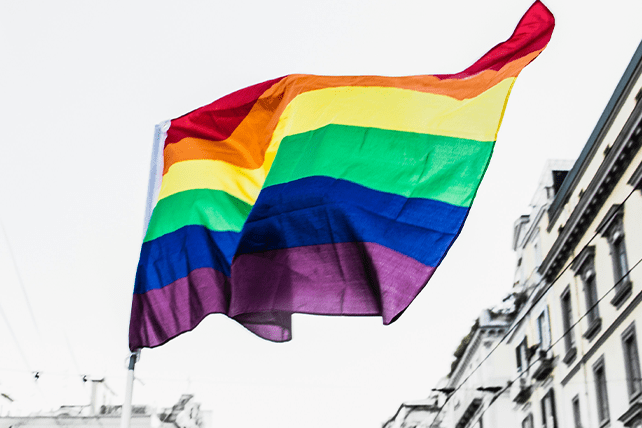This is part one of a two-part series on how church leaders can faithfully engage LGBT conversations.
June is Pride Month in the United States, which is now nearly over. The topics of sexuality and gender are at the fore of the conversation in this cultural moment. These are incredibly challenging topics for pastors and church leaders who are unsure of how to respond to LGBT-related concerns in a way that is both faithful to Scripture and seeks the dignity of those people for whom these topics of discussion are a very lived and present reality.
Some church leaders prefer to keep quiet and hope this month passes without impacting their churches or upsetting too many people. But that sort of cultural hibernation is not realistic anymore, and it will become increasingly difficult in the years ahead. We can’t hide in the basement and hope this new sexual revolution passes us by.
We can’t hide for two reasons. First, the new sexual revolution isn’t going away. It has forever altered the landscape of our dialogue around sexuality and gender. Second, conversations around sex and gender ethics are not like a tornado that rips through an Oklahoma town—from which you take cover and hope for the best. It involves real people with real struggles and questions, many of whom are young people in your churches. Therefore—if I may be so bold—hiding out and avoiding LGBT conversations is pastoral malpractice.
The New Sexual Revolution
Between the 1960s and 1980s, the “sexual revolution” movement impacted our culture significantly in the way we perceived behavioral codes, sexual liberation, and sexual repression in heterosexual and homosexual relationships.1 In large part, the sexual revolution catalyzed changes in a variety of cultural norms, including the appropriateness of dress, relationships between genders, the casual nature of sexual encounters, and more—things that are mainstays in American culture today.
Now, nearly 60 years from its onset, we are amid a new sexual revolution. Sexuality has become significantly individualized and commodified. However, this new sexual revolution goes beyond sexual relationships and is a declaration of autonomy, asking society, “Is it anyone’s right to question an individual’s gender and sexual preferences?” We see this throughout our society, not simply on television or in academia. The new sexual revolution has profoundly affected people in our churches as well, especially our young people.
Pastors can’t respond to every issue that comes across our newsfeeds. Another extreme to hiding out exists, and that is deputizing oneself as a cultural commentator on every outrage du jour that trends on social media. That is an exhausting life, and that distracts you from your primary duties of proclaiming the gospel, teaching the Word, and shepherding God’s flock.
However, part of shepherding God’s flock often necessitates speaking to some issues as a matter of discipling our people out of the outrage of the culture wars and into the patient, loving, but ever-engaged life that we see Jesus live in the culture of his time (a Greco-Roman Culture which, by the way, resembled more of what we experience today in American society than the Victorian modesty codes of centuries past2). This pastoral engagement requires wisdom and sensitivity, with a commitment to pointing people to Christ. The LGBT conversation is one issue that demands pastoral discipleship if the church is to dialogue with LGBT persons with faithfulness and gentleness.
So, this is not an issue we can pass on. We need to teach an unapologetic call to a vision of sexuality that is faithful to God’s design for humankind. And we must do this in a culture that has abandoned such views and sees them as out of touch—even dangerous. Please hear me; the answer to this is not an extreme and marginalized purity culture such as the one that has been prominent in evangelical circles of the past. We need to equip our congregations better on what it means to live out our faith in this new sexual revolution and to do so clearly and with grace. We need a better vision for a cruciform theology of desire that includes but transcends the topic of sex alone.
Clarity Is Kindness
As a pastor, you may wonder how often to speak up and speak out. It’s worth noting that my role is a bit different now than when I pastored a local church. I’m here to support a public Christian witness in places where most pastors are not. I’ve defended the traditional Christian view of sexuality in the pages of USA Today, on countless news programs, and my own podcasts and publications. Why? Because sexuality is one of the defining issues of our day. I want to equip people as they are most certainly impacted by this new sexual revolution.
Yet, this is also (and primarily) a local church issue. Recently, I led our staff at Mariners Church in a discussion addressing three areas where society most frequently challenges orthodoxy today. They included 1) biblical authority, 2) gospel exclusivity, and 3) Christian sexuality. The reason I write and speak on issues of sexuality often is because many in our churches struggle with their sexuality or know someone personally who struggles. Pastors and church leaders must discern how best to address these issues in a biblical yet non-combative way.
1 http://www.glbtqarchive.
2 L.L. Welborn, “Paul, the Fool of Christ.” (New York, NY: T&T Clark, 2005), 6.

